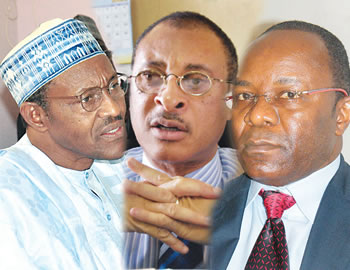The current economic travail of the country has resuscitated the arguments and counter-arguments about crude oil, popularly known as ‘Black Gold’ is a curse since it was discovered. In this report, OLATUNDE DODONDAWA examines why it seems this argument holds water.
Everywhere you turn nowadays, people, both old and young, wear long faces. They tell you without being asked that the economy is bad and their personal situation are very worse. Many Nigerians now complain of hunger in a country that once look pride in her enormous petro-doller wealth.
But how did Nigeria, a promising nation of highly re so useful citizenry, come to this sorry pass? How has oil engineered the rise and full of the nation considered as the most populous black nation in the world? Is crude oil a curse or a blessing to the people of Nigeria?
Though both Professor Pat Utomi, a renowned economist and public analyst and Mr Dolapo Oni, Head, Energy Research, Ecobank Development Company Limited argued that crude oil has enriching components, it can also bring about oil economic catashophe instead of prosperity.
Prior to the discovery of crude oil in Oloibiri in present day Bayelsa State in 1956, agriculture was the mainstay of the Nigerian economy. The Western Nigeria was known for its cultivation of cash crops like cocoa and food crops like yam, beans, cassava, maize and others like poultry.
Eastern Nigeria was known for its palm oil plantations, yam, entrepreneurship and commerce. Northern Nigeria was known for its groundnut pyramids in commercial quantities well positioned for export. It was also known for its traditional love for animal husbandry.
The regional governments especially, especially the Western Region through its produce boards, collected proceeds from sales of these agricultural produce and pay huge taxes to the central government. However, things began to change when crude oil was discovered.
Why crude oil is called ‘Black Gold’?
Crude oil is a naturally occurring unrefined petroleum product composed of hydrocarbon deposit and other organic materials. Crude oil can be refined to produce usable products such as gasoline, diesel and various forms of petrochemicals. It is a non-renewable resource also known as fossil fuel, which means that it can’t be replaced naturally at the rate we consume it and it is, therefore, a limited resource.
It is globally referred to as ‘Black Gold’ because it is a resource that is well sought after by governments and individuals from around the world, by comparing its worth with the precious metal known as gold.
When the Black Gold was discovered in 1956, it was too late for the colonial masters to reverse the agitation for independence set in motion by the founding fathers of the nation through the constitutional conferences geared towards self rule, which had started earlier.
The post-civil war era ushered in a federal system of government and eradicated the regional and the parliamentary governments the country had been operating after independence.
What went wrong?
The fact that the country discovered crude oil just before independence; the fact that the country went into civil war less than a decade after and the fact that there was global oil and economic boom at about the same period should not be considered as a mere coincidence.
If Nigeria had discovered crude oil in the 1940s, the British Government, it is usually argued by political and economic experts wouldn’t have conceded to grant the country its independence when it did. It would have resorted to exploiting the God-given resources to the detriment of the colonial state.
The civil war lasted for 30 months, during which the Nigerian government enjoyed the support from some foreign governments with their eyes on big interests in the Nigerian oil and can only get it through support from people in the central government.
Shortly after the war ended, the golden era set in—the era of oil boom (1971-1977). As of 1971, the share of agriculture in the Gross Domestic Product (GDP) in Nigeria stood at 48.23 per cent. By 1977, it had declined to almost 21 per cent, while crude oil became the largest earner of foreign exchange to the country.
Agricultural export, which was 20.7 per cent of total exports in 1971, reduced to 5.71 percent in 1977. The discovery of oil, coupled with the oil-boom resulting from the Arab oil embargo on the U.S in 1973, affected the agricultural sector adversely. The economy became heavily dependent on oil. By this time, oil revenue represented almost 90 per cent of foreign exchange earnings and about 85 per cent of total exports. While the boom afforded the government the much-needed revenue, it also created serious structural problems in the economy.
Oil discovery ‘killed’ agricultural sector
Government policies like Operation Feed the Nation (OFN) could not reverse the deteriorating food situation as government itself was involved in direct food production, provided subsidies to peasant farmers and created more commodity board.
Policy makers advised the government not only to embark on ownership and control of the commanding heights of the economy like the petroleum and mining sectors, but also to be directly involved in banking, insurance, clearing and forwarding, among others. Government decided to take Warri refinery that was built and operated by Shell D’archy in a private capacity, and turned it into a less efficient business and an apparatus used by political elite to siphon state funds. The government introduced subsidy for the first time so that all citizens will ‘enjoy’ fuel consumption at same price irrespective of their locations. If Warri Refinery was not taken over by the government, more investors would have built several refineries and sold their product at competitive prices.
With the promulgation of the Nigerian Enterprises Promotion Decree in 1972, Government became directly involved in virtually all aspects of the economy, especially as foreign exchange was thought to be no longer a constraint to development.
The policy led to massive corruption, theft, outright looting of government treasury and other fraudulent practices prevailed. The state, on its own part, intensified the creation of a business class that depended solely on government contracts rather than on production.
The gap between the rich and the poor widened considerably. Ad-hoc and ill-conceived government policies exacerbated the problem. For example, the 100 per cent salary increase of 1975, tagged the Udoji Salary Award, was disastrous for the economy as prices increased by more than 100 per cent. The payment of a year’s arrears of the increase in salary further worsened the situation.
In fact, the then military head of State General Yakubu Gowon was reported to have said that Nigeria’s problem was not money but how to spend it. Little did the goverment and know that our problem then not how to spend money; it was the absence or lack of a visionary leadership that knew how to spend money wisely by investing and re-investing it.
However, the problem became worse as the U.S and the Arab nations, especially Saudi Arabia, settled their differences and resumed oil sales to the U.S, thereby crumbling crude oil price which fell sharply and austerity set in Nigeria.
What has changed?
Nothing really has changed structurally when it comes to Nigerian government and policy making. What actually led to austerity in the late 1970s till late 1980s was ineffective management of the country earnings from its resources.
Available date show that the balance of payment did not improve. There was an increase in external loans which further accelerated the debt over-hang situation. It was clear that the economy was suffering from stagnation. The country’s industrial capacity utilisation, which was 73.6 per cent in 1981, declined consistently during the period such that by 1989, it was only 31 per cent.
Manufacturing which grew at 14.6 per cent in 1981 reduced to 3.2 per cent in 1989. This poor performance occurred despite various stabilisation policies of the 1980s. The structure of the economy made it vulnerable to external shocks and policies.
By the dawn of 2016, the country is back in a cul-de sac. The economy continues to shrink, commodity prices are soaring and the government seems helpless in the face of decreasing revenue and economic recession.
More so, Nigeria lost its place as the biggest economy in Africa to South Africa. In 2014, South Africa lost the position to Nigeria, congratulated the country and went back to the drawing board to grow her economy, while Nigeria seemingly went to sleep.
Between the year 2006 and 2014, crude oil was at an average price of $100 per barrel and went as high as $140 per barrel mid-2014 before it moved downward, reaching almost $20 per barrel before stability set in.
As a mono-economy country, the leaders lacked vision to save for the future. Sometimes, the Nigerian Governors’ Forum took the Federal Government to court because it decided to save part of the windfall as a Sovereign Wealth Fund (SWF). Their argument was based on the fact that the Constitution does not provide for savings but to share everything. It was reported that they claimed the future will take care of itself.
‘Black Gold’ as an ‘evil spirit’
Fight over who controls ‘Black Gold’ in the Middle East has been the major cause of unrest in that region and it may continue to be until it is all dried up. South China Sea has been in existence for thousands of years without any trouble among China, Japan, Singapore and their neighbours.
However, when the U.S made public the findings of its research on the South China Sea in the year 2000, hostility began to brew among the neighbours. The research revealed that the area has several trillion tons of ‘Black Gold’ deposits.
China and its neighbours are relying on historical facts by laying claims to the larger portion of the Sea in other to have larger share of the resources.
Moreover, it would be unfair not to emphasise that discoveries of ‘Black Gold’ in places like Canada, Russia, U.S, Saudi Arabia, Iran, Equatorial Guinea and others of same class have been a tremendous blessing to these nations.
Reacting to the issue whether under oil is a blessing on wise to Nigeria, Mr. Dolapo Oni, Head, Energy Research, Ecobank Development Company Nigeria Limited, argued that crude oil isn’t a curse but a blessing, depending on the managers of the discovery.
According to him, “I do not believe crude oil is a curse. We can point to several countries around the world that have used their natural resources to make the lives of their citizens better. The problem has been the management of the resource. We need to consider new models of managing the resource and limiting personal access to the revenue from crude oil. I believe if we channel the money directly into infrastructure funds that are directly linked with specific infrastructure that is lacking, we might make more progress.”
On the agitations in some quarters for state control of natural resources as a panacea for efficient management of resources, Oni posited that “having state resource control is not necessarily a better option, (i.e. giving the state control of the resources). I believe if they haven’t been able to manage the resources they have received from the centre over the last few decades, they are unlikely to do it differently.
“However, what needs to be done is to give the states more access to the oil fields to develop and produce for themselves. This would boost their IGR, since the resource is in their state anyway.
“This could take the form of allowing them a stake in some fields or allocating specific blocks to the states.”
While making his contribution through a telephone conversation, economist and public affairs commentator, Professor Pat Utomi, noted that there has been a global conversation for years on whether oil is a curse or a blessing.
“But if you look at countries that have managed their affairs very well, you will realise that oil has managed to be a blessing. Classic example is Norway. But if you go to developing countries, you will see comparison between Indonesia and Nigeria.
“Indonesia has always been considered Nigerian development twin. Both of them are growing but in different direction. They are both populous and oil gifted countries. Indonesia developed its oil, and it also successfully diversified its economy. Their oil sector is striving, their industry sector is not doing badly and their agriculture is also doing fine.
“Oil is not supposed to be a curse, but the way Nigerians have run it has made it, unfortunately, a source of damage rather than advantage. My personal prayer is for oil to drop to as low as $4 per barrel and stay there for four years so that we can begin to have an economy. There is something wrong with the way we behave. We are waiting for oil price to go up and we will be in a more dangerous situation.
“My argument for years has been that when you are in a commodity-dependent economy and the commodity is in boom, you save significant part of your earnings. And you use your savings to attract other savings from abroad and make investment in other areas of growth,” he said.
On agitation over resource control by state, Utomi posited that “I am an advocate of restructuring Nigeria and I have no question about that. Nigeria made more progress when it had regional government. For instance, someone told me a story by a senior Northerner although I cannot verify its authenticity. He said Sardauna of Sokoto, Sir Ahmadu Bello, attended a meeting in Lagos, being the then capital of Nigeria, and it was announced that the Easterners will soon be exporting crude oil.
“After the meeting, Sardauna met with his cabinet in Kaduna and informed them about the potential oil export by the Eastern region. He was so happy that his cabinet members were worried and asked why he was happy about the development, but he told them that it is an opportunity for them to develop their agriculture and begin to feed the Eastern region. He said this is because once oil proceeds begin to come, the Easterners won’t be able to farm anymore. He said if they (the North) develop agriculture, they will be taking oil money from them (the East) in exchange for food they will eat.”
Utomi explained that Nigeria started the process of industrialisation when Chief Obafemi Awolowo moved to set up an Industrial Estate in Ikeja, the Premier of Eastern region said the West cannot be ahead of them so he established two (industrial estates) simultaneously, one in Aba and the other in Port Harcourt to compete against Ikeja.
Northern region established Kakuri Industrial Estate in response and Kaduna became the hub of textile industry in Africa.
“The same happened in television when Western region established the first television station in Africa, WNTV in 1959. The Eastern region also quickly set up their television station. So when the Westerners say WNTV, first in Africa, Enugu will reply, Eastern Nigeria Broadcasting Television, ‘Second to none.’ And that was the competition that brought progress. All these have been lost by lazy governors who were going to collect fat sums of money from Abuja. During the Obafemi Awolowo administration, the entire Western region from Lagos to Asaba had 12 ministers (now Commissioners).
“But to today, each has several commissioners and if you count today, we cannot have less than 300 commissioners and several advisers within the same region that was managed with 12 ministers,” he said.
On the way forward, Prof. Pat Utomi argued that “The pain from oil is self-inflicted. I have argued for years that Nigeria should have a benchmark price for spending. I have suggested $40 per barrel and everything from $40 to $70 should go into a Stabilization Fund, which can be borrowed from if there is a downturn to ensure we have a stable $40 per barrel investment. If it goes above $70, the excess should go into a Future Fund (Sovereign Wealth Fund) so that we will be investing the Future Fund.”








